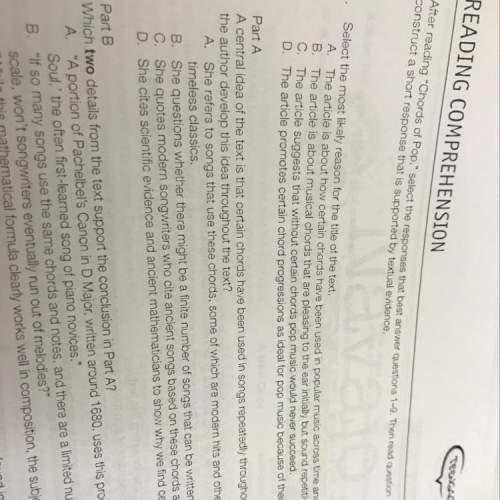
English, 16.12.2021 02:50 dayanaraa61
From President John F. Kennedy's Inaugural Address, 1961
…In your hands, my fellow citizens, more than in mine, will rest the final success or failure of our course. Since this country was founded, each generation of Americans has been summoned to give testimony to its national loyalty. The graves of young Americans who answered the call to service surround the globe.
Now the trumpet summons us again—not as a call to bear arms, though arms we need; not as a call to battle, though embattled we are—but a call to bear the burden of a long twilight struggle, year in and year out, "rejoicing in hope, patient in tribulation"—a struggle against the common enemies of man: tyranny, poverty, disease, and war itself.
Can we forge against these enemies a grand and global alliance, North and South, East and West, that can assure a more fruitful life for all mankind? Will you join in that historic effort?
In the long history of the world, only a few generations have been granted the role of defending freedom in its hour of maximum danger. I do not shrink from this responsibility—I welcome it. I do not believe that any of us would exchange places with any other people or any other generation. The energy, the faith, the devotion which we bring to this endeavor will light our country and all who serve it—and the glow from that fire can truly light the world.
And so, my fellow Americans: ask not what your country can do for you—ask what you can do for your country.
My fellow citizens of the world: ask not what America will do for you, but what together we can do for the freedom of man.
Finally, whether you are citizens of America or citizens of the world, ask of us the same high standards of strength and sacrifice which we ask of you. With a good conscience our only sure reward, with history the final judge of our deeds, let us go forth to lead the land we love, asking His blessing and His help, but knowing that here on earth God's work must truly be our own.
Read this sentence from the passage:
Now the trumpet summons us again—not as a call to bear arms, though arms we need; not as a call to battle, though embattled we are—but a call to bear the burden of a long twilight struggle, year in and year out, "rejoicing in hope, patient in tribulation"—a struggle against the common enemies of man: tyranny, poverty, disease, and war itself.
What effect does Kennedy intend for this reference to battle to have on the readers?
To ask them to join in the struggle against enemy nations
To encourage them to support those serving in the military
To inspire them to work together toward a common good
To warn them that war with aggressive nations is about to happen

Answers: 2


Another question on English

English, 21.06.2019 15:30
Me ! one reader of sorrentino's story said, "it reminded me that everyone can have a different perspective and a different response to the same event, and that response can change over time." in at least two hundred words, explain what you think this means.
Answers: 3

English, 21.06.2019 23:20
Why do u think the boys care so much about being called by their nick names from the movie holes
Answers: 1


English, 22.06.2019 10:30
What aspects of a story the reader understand the authors purpose
Answers: 2
You know the right answer?
From President John F. Kennedy's Inaugural Address, 1961
…In your hands, my fellow citizens, more...
Questions

Geography, 28.11.2019 04:31

English, 28.11.2019 04:31


Geography, 28.11.2019 04:31



Mathematics, 28.11.2019 04:31

English, 28.11.2019 04:31

Mathematics, 28.11.2019 04:31









Mathematics, 28.11.2019 04:31





